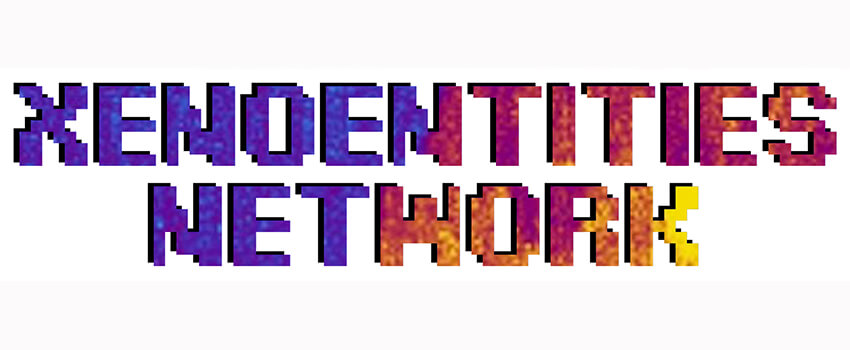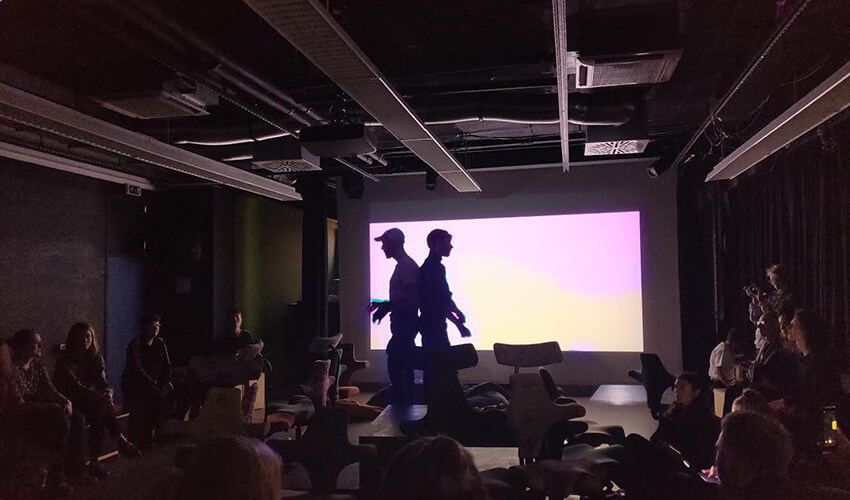Interview by Laura Netz

XenoEntities Network (XEN) is an open-community platform based in Berlin and organised by Lou Drago, Pedro Marum, and Zander Porter. XenoEntities Network’s curated programs organise performances, screenings, discussions, readings, panels, and also Assemblages, which are free-access gatherings where community members propose topics and ideas within the scope of the platform. XenoEntities Network debates are centred in a queer/feminist/gender context embracing discourses of anti-hegemonic patriarchal mentalities.
Interested in diversity and inclusivity on digital platforms and in anti-racial practices, in 2016, XenoEntities Network presented Xenometrics, at Spektrum Berlin, a curated program of film screenings about digital surveillance, cyber-surveillance and dataveillance using biometric technologies. In a network of info-militarism, citizens’ fears and anxiety are exposed from the physical extension of surveillance machinery (CCTV, drones, border checks) to the data mining in online information exchange platforms (emails, websites, social media), using biased algorithms that perpetuate supremacy and marginalise the difference and otherness.
More recently, they presented Queer Temporalities: Raving Architectonics, an event about community-building and social collectivity through rave and queer theory to highlight the importance of share with others. Through sound, film, discussion, and in a learning context, the participants referenced the works of Paul B. Preciado and Martti Kalliala.
According to the collective, the influence of rave culture in Berlin City has made them approach this aesthetic and current trend in counterculture and underground towards new paradigms of theory and art practice. XenoEntities Network has been presenting Assemblages since 2016. Located in Spektrum Berlin, until its recent closure, the curated program promotes free-access gatherings in a get-together experience of the networked and community-oriented project. Discussions, reading sessions and film screenings about queer futurities, transhumanism, post-apocalyptic futurism, and cyber-utopism take place influenced by authors such as José Esteban Muñoz and Ashkan Sepahvand. Moreover, Assemblages collaborates with artists such as the Scent Club Berlin and invites queer electronic musicians such as Born in Flamez and the Thalamus Collective.
Among other collaborators, there is Chris Korda, the American activist, software developer, performer and electronic musician known as the Reverend of the Church of Euthanasia, inventor of an AI-enhanced musical instrument (ChordEase), and a polymeter music sequencer.
XenoEntities Network influences raise from Karen Barad’s agential realism to theories about the behaving of electrons in quantum physics in an attempt to deconstruct matter, identity and power. Also, Donna Haraway’s theories of promoting trans-specism ethics in a Biogenetic capitalism era. Indeed, XenoEntities Network’s programs reflect on ontological aspects of the present life and ethics of inhumanism, posthumanism, and transhumanism.

XenoEntities is a platform for discussion and experimentation focusing on intersections of queer, gender and feminist studies with digital technologies. There are three of you in the team. Could you tell our audience that is not familiar with your work, your background/interest and your main aims behind XenoEntities?
We, Pedro Marum, Zander Porter and myself, Lou Drago, all have varying backgrounds across different artistic and theoretical backgrounds, including film, curation, DJing, performing and writing. However, we share a common interest in feminist/gender/queer discourses and how these subjects have been and are still being expanded through the lens of technological development, digital culture and futurism. In 2016, Pedro initiated a programme at Spektrum Berlin called Xenometrics, which he invited me to co-curate. Since that, we have curated programmes that include performances, screenings, discussions and panels. Zander joined us in mid-2017.
Our programmes revolve around contemporary art and philosophical-theoretical themes such as posthumanism, xenofeminism, cyborgs and prosthetics, surveillance technologies, and virtual reality, amongst others. In addition to curated programs, we organise what we call “Assemblages,” which are free-access gatherings where community members are free to propose topics and ideas within the scope of the platform.
We often invite speakers from different fields to our sessions and organise round-table discussions with readings of relevant materials or discussions of texts, films or artworks. Our aim is to speculate about new forms of existence, the potential of expanding subjectivities and also to foster a community of like-minded thinkers from different backgrounds. XEN is an open community platform for anyone from any background who has an interest and curiosity in these topics and is willing to expand/corrupt/disrupt/explode them in safe(r) contexts.
What have been the main challenges you have encountered developing the platform?
The main challenge with what we have been doing is, sadly a financial one. The main space we operated in required a venue hire fee which we recuperate by charging a small door entry for events, leaving only a small budget for paying artists (something fundamentally important for us). As we each navigate our other paid work, it does become strenuous both in energy and time to meet regularly to work on the project. We’ve recently learned of the closure of our regular space, and so we’re currently on the search for new venues as well as funding opportunities.
XEN is based in Berlin, where you seem to be very involved in a community network, developing really exciting things. Do you think you could be exploring Xenoentites the same way in another city?
i don’t know, certainly not in the same way, no. Each city has its idiosyncrasies, and the melting pot of people that gather in Berlin and are drawn to our programmes offers something very unique. If we were based in another city, we would certainly be trying to do something similar, but depending on the context, it’s inevitable we’d face different restrictions.
We have been invited and also initiated programmes in other cities, including London, Cologne, Krakow, Lisbon, Athens and Melbourne, and it has been interesting to see how our work has been warmly received in each of these contexts. The issues and ideas that we are dealing with are shared by many people, so I would imagine that we could pursue similar aims if we were in another city.
In Queer Temporalities: Raving Architectonics, a project you have been pursuing in several facets, you introduce the historical yet topical idea of “rave” as a site for emancipation and community-building, drawing links between this and queer temporality. What are your main aims behind this project? What have you achieved so far, and what have you planned to pursue further?
Thinking about the socio-political implications of rave and the potential of these sites for community building and strengthening is certainly something contextually relevant to our experiences in Berlin. Through our readings of queer theory, we saw several correlations to rave experiences, and through the ensuing discussions and provocations of these ideas, our own experiences within the rave have been expanded.
It’s also interesting to draw ideas and experiences from the rave back into thinking about other forms of social collectivity. We hope to share these perspectives with others who come from less ravey backgrounds or other ravers who have different experiences to think further on these ideas and speculate about the potential for a xenofeminist, anti-racist future. We began the project for an experimental class at the University of Cologne, which was a mixture of text discussion, performance, and film screening.
We found a lot of potential with this format, mostly in the sense that it made students comfortable to participate and be engaged on another level. We’ve also hosted two Assemblages on the subject, in Melbourne and in Berlin, which were both very interesting because of their radically differing contexts. Now we have the job of discussing the outcomes of these 3 very different experiences to see in which way it makes sense to expand this discourse.
What are, in your opinion, the challenges of redefining gender we are facing nowadays and how digital interfaces and altered realities can play a role in it?
i think the biggest challenge is hegemonic, patriarchal mentalities and the need to find ways to build bridges between differences in understanding. Also, a huge challenge i have noticed is the ‘call-out culture’, which happens from within queer/ feminist/ gender discourses.
The fear of saying the wrong thing or of not appearing politically correct stifles attempts at expanding ideas, and conversely, the fear of the ‘wrong’ information or ideas being propagated inspires people to speak out against certain ideas which may not yet be fully formed.
Social media plays a huge role in this, as these platforms are rarely the place for nuanced discussion. There is such a reflexive and rapid temporality to online debate that meanings are readily misconstrued. However, digital interfaces do have the potential to allow a plethora of diversity because of the added distance the digital realm potentiates.
Mainstream media influences are also a challenge to negotiate as their desire for accessibility and acceptance oftentimes reinforces and reproduces binary gender representations and hegemonic (beauty) standards.
What do you think about the biotechnological and biopolitical domination of our bodies in the current times?
That’s a pretty big question. With, of course, an ambivalent answer. Biotechnology obviously has its benefits; for transgender people, for people with varying abilities, for all people who benefit from healthcare, really.
But of course, when we discuss biopolitical implications, we acknowledge the fact that these technologies are controlled by systems and corporations that work in a capitalist system. We cannot trust that they have our best interests in mind or that they have the capacity to allow for the multiplicity of bodies and subjectivities in question.
We eventually have to make compromises, and subjectivities are flattened and normalised in order to benefit from biotechnologies. Ultimately we can only acknowledge the complexity of the situation and do our best to understand what is happening and do the best to navigate biopolitical forms of control, and minimise suffering.
What directions do you see taking Xenoentities’ work into?
Firstly we need to find a new space! But eventually, i can imagine that we would like to commission artworks, offer space/money to artists in our community to produce work, share our knowledge and ideas through writing or presenting at conferences in other countries etc.
What is your chief enemy of creativity?
Capitalism. Between the financial pressure to pay rent, eat etc., and the neoliberal pressure to produce exponentially, gain visibility, network etc., having (mental) space to be creative becomes difficult. Creativity needs time to breathe.
You couldn’t live without…
Oxygen, water, food, shelter/warmth, and companionship.






